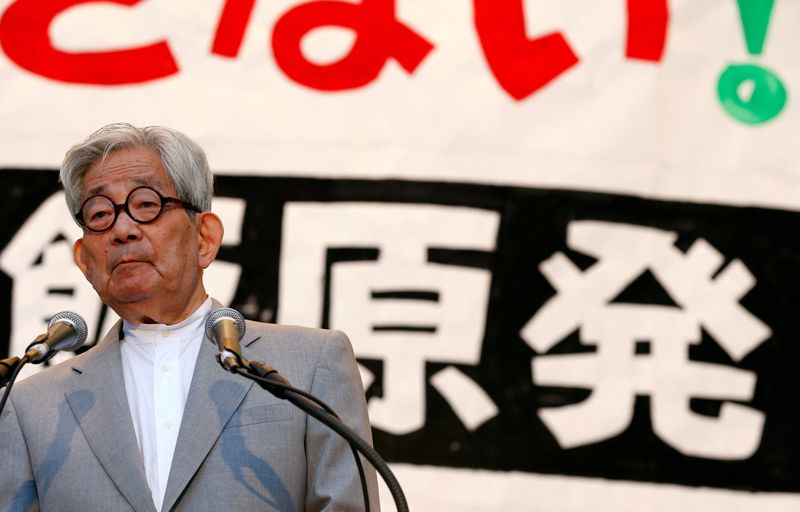TOKYO (Reuters) -Kenzaburo Oe, who won Japan its second Nobel Prize for literature with books about the horrors of war and about his disabled son, has died at the age of 88.
Oe also later became known as a prominent campaigner against nuclear weapons and nuclear power.
His death, on March 3, was due to old age, his publisher Kodansha said.
Ten years old when Japan was defeated in World War Two, Oe was scarred by his memories, which included being asked in school every day if he was willing to die for the Emperor and feeling shame when realising in bed at night that he wasn't.
He wrote about gruesome tales of the atomic bombing of Hiroshima and noted how his shock at what he had heard may have been his inspiration for becoming a writer.
Oe was never afraid to hold his country to account and was scathing about former Prime Minister Shinzo Abe's efforts to revise Japan's pacifist constitution.
Japan bore "some" responsibility for the war, he said in a 2014 interview.
"This war, in which so many large powers were involved, caused great suffering for people all over the world... And it is a reality that within this immense war, nuclear weapons were created and used."
His brain-damaged son Hikari also became a driving force of his literature. Hikari was for years unable to communicate with his family but as an adult became known as a composer. Oe has said that much of his writing was an attempt to give Hikari a voice.
Several of Oe's books have characters based on Hikari, with one, "A Personal Matter," talking about difficulties accepting the child. The Nobel committee singled out a number of these books when he won the prize in 1994.
"Although I myself am perhaps quite a dark novelist, I believe that also my novels show a kind of trust in human beings," he said in 2014. "And this has come from my son."
Oe was born in Shikoku, the smallest of Japan's main islands, the third son of seven children. After his father died suddenly in 1944 at home he was raised by his mother, who bought him books such as "Huckleberry Finn."
A graduate of Tokyo University, where he studied French literature, Oe began publishing stories while still a student and won the Akutagawa Prize, a career-launching award for new writers, in 1958. A steady stream of work followed, including books on the bombings of Hiroshima and Nagasaki.
His Nobel Prize was followed by Japan's Order of Culture, but he refused to accept it because it was awarded by the Emperor. "I do not recognise any authority, any value, higher than democracy," he said.

Always a pacifist, Oe became an even more vocal critic after the 2011 Fukushima nuclear accident, saying that Japan had "a sacred duty" to renounce nuclear power, the same way it renounced war under its constitution. In 2013 he organised an anti-nuclear rally in Tokyo and in 2015 joined thousands to protest moves by Abe to let Japanese troops fight abroad.
In 1960 he married Yukari, the sister of late film director Juzo Itami, noted for his satires of modern life. Hikari, the first of their three children, was born four years later.